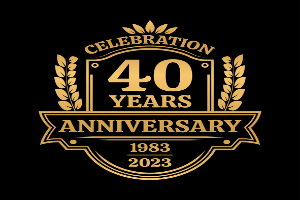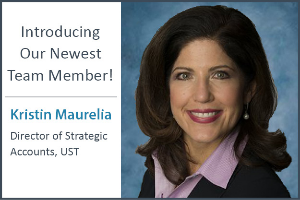
UST has been on the front lines of supporting the nonprofit sector with effective workforce solutions that reduce costs and strengthen their missions for four decades. Throughout our journey, UST has built a reputation for providing innovative solutions and excellent customer service to our 2,200+ nonprofit members—working tirelessly to help nonprofits build strong, effective workforces that support their mission-critical initiatives while also saving valuable time and money.
One of the reasons UST has been so successful over the last 40 years is our deep understanding of the nonprofit sector and the unique challenges facing nonprofit organizations, from funding constraints to the need for specialized expertise. We continue to develop services that are tailored to meet the specific needs of nonprofits, whether it’s reducing unemployment costs, maintaining compliance with state and federal legislation, or tackling day-to-day HR needs.
As we celebrate our accomplishments over the last four decades, we also recognize that our success is due largely to the overwhelming support we receive from the nonprofit sector and consider ourselves extremely fortunate to work with people who share in our passion to strengthen nonprofit communities across the country.
A word from UST’s Executive Director, Donna Groh:
As UST celebrates its 40th anniversary this year, we are very proud of how many nonprofits we have helped over that span of time. To give a little perspective, UST has successfully:
But we are not resting on our laurels. Last year, we created a subsidiary LLC that will be developing programs to support nonprofit employers whether they are members of the Trust or choose to manage their unemployment benefits on their own or through the state tax system. The programs and services we will be focused on will be those that will help nonprofit employers attract, engage, and retain a vibrant workforce. We will have more details as specific programs develop so stay tuned.
Finally, as we look to the future, I will be stepping down as the Executive Director of UST and retiring in the Fall. We recently identified (and appointed) an impressive individual who will be coming on board this Summer for which I will provide an onboarding and consultative transition over the coming months.
To all of you who have been on this journey with us, we thank you and look forward to continued partnerships.

UST is very pleased to welcome Kristin Maurelia as our new Director of Strategic Accounts!
Kristin’s accomplishments are not easy to summarize. Notably, she was asked to lead a new strategic alliances initiative at the National Association of REALTORS®—the world’s largest trade association with over 1.5 million members. Kristin built from inception, a strategy and business unit that grew to over 160 dynamic, creative alliances, including some of the nation’s largest companies and strongest brands—ultimately generating more than $100M in association revenue and providing valuable member benefits to the tune of $75M annually.
Driven by genuine curiosity and a commitment to building authentic relationships rooted in integrity, Kristin has forged impactful, long-term partnerships with allies across various industries. With a passion for mission-driven work and a call to community service, Kristin is also an active member of the nonprofit community, serving as a volunteer for Pilot N Paws and Be My Eyes.
Kristin’s extensive experience, proven track record, and shared desire to see the nonprofit sector thrive make her a perfect addition to team UST and an ideal ally for our 80+ plus Affinity Partners nationwide. We’re very excited to begin UST’s next chapter with her at the helm of this vital role in our organization.

The Coronavirus pandemic has pushed the economy into a sudden and deep recession, impacting local businesses as well as a number of large corporations. But the effects of this pandemic on the nonprofit organization has been even more substantial and unfortunately, gone unnoticed. Many citizens rely on the services nonprofits provide such as, social services, medical care and spiritual community. Tens of thousands of nonprofits are likely to close without the support of some kind of rescue package to help keep their doors open. The nonprofit sector is the nation’s third-largest private employer, with 1.3 million nonprofits employing nearly 12.5 million people—about 10 percent of the total number of people working in the private sector.
According to the John Hopkins University 2020 Nonprofit Unemployment Report, more than 1.6 million nonprofit jobs have been lost between March and May of 2020. Private education nonprofits lost an estimated 323,201 jobs, while health care lost an estimated 574,530. As we know, nonprofits come in many shapes and sizes, ranging from large organizations, like city hospitals to small mom and pop thrift shops that help support local charities. No matter the size, nonprofits have been severely impacted by the pandemic in more ways than one. Many nonprofits are unable to perform normal day-to-days tasks due to the number of shutdowns and social distancing requirements. For food pantries and free clinics, the economic disruption has caused an increase in clients in need of these services. While many think of nonprofits as running predominately on donations, roughly half of their revenue come from billing for services, a third from government contracts and grants, and only about 9 percent from individual donations.
While some foundations and charitable-giving funds have seen an increase in their donations, other nonprofits have not had the same luck due to relying on revenue-generating activities and fundraising. Making it not only difficult to keep people on the payroll but also impacting long-term viability of their organization.
Many nonprofits were eligible for federal pandemic aid under the Paycheck Protection Program, which extended potentially forgivable loans to small employers to keep workers on the payroll. But qualifying for such aid can be difficult. Give Kids the World received $1.75 million, however, organizations like the Y.M.C.A. of Metropolitan Chicago were left out because they had more than 500 employees.
The nonprofit sector has more of an impact on the overall economy than many realize—offering crucial contributions to the country’s health, education, social service, and cultural activities. Nonprofits not only make up the country’s third largest workforce but also generate the third largest payroll of any national industry while making important contributions to the tax revenue of the country’s national, state, and local governments. The devastation of this pandemic has put many individuals out of work while closing the doors of many other beloved nonprofits—putting pressure on the vital services these organizations offer their communities.

UST is deeply saddened by the series of disturbing and tragic events that have taken place over the last few weeks related to the violence and injustice toward the Black community—including George Floyd, Breonna Taylor, Ahmaud Arbery, and countless others. The resulting protests have created a long overdue flashpoint for awareness, action, and change.
UST has supported the nonprofit community for over 35 years and we are proud of the impact that each of our members have in their communities. We know that communities that have nonprofit organizations established within experience less crime, such as murder, violent crime and crimes against property. Sharkey’s work also affirms some of the tenets of community policing: that neighborhoods are vital to policing themselves, and that they can address the complex roots of violence in ways that fall beyond traditional police work. Whether it is taking back the public parks, establishing mentorship programs for youth or implementing job training and employment opportunities, these all make a difference. But. That. Is. Not. Enough.
UST does not do this work directly but we support the organizations who do in their efforts, their ideals and their fight for more social justice and equity in communities across the nation. We are fortunate to have a strong board of Trustees who are all working in their own spaces for change. We think our current Board Chair, Karen Beavor, CEO of the Georgia Center for Nonprofits has expressed our sentiments exceptionally well. View her complete message here.
UST will continue to support the work our nonprofit members do to address these issues; we will listen, and will actively look for ways to be part of the change that is so desperately needed.

For a limited time, UST opens registration to all 501(c)(3) nonprofit executives interested in learning more about their organization’s unique tax alternative.
UST, a program dedicated to providing nonprofits with dedicated HR support and educational tools, presents an exclusive 30-minute webinar to showcase some of the most common unemployment & HR risks that can cost your nonprofit thousands of dollars annually.
UST shares insights into their many service offerings as well as best practices that can help reduce costs and streamline workforce processes.
Nonprofit executives, finance directors, and HR staff should register to learn about:
Whether your primary focus is to protect your assets, ensure compliance, reduce unemployment costs or to simply allocate more time and money to your mission-driven initiatives, this webinar can provide invaluable insight and resources that can address many of your ongoing pain points – helping you to refocus your funding and employee bandwidth on the communities you serve.
If you work for a 501(c)(3) nonprofit with 10 or more full time employees, register for the August 20th or September 18th webinar before space runs out!

September resulted in positive job growth with employers adding an additional 134,000 jobs—resulting in an average monthly gain of 201,000 over the past 12 months. These jobs were added across a variety of sectors including professional and business services, health care, transportation and warehousing.
The unemployment rate dropped by 0.2 of a percentage point to 3.7% in September, and the number of unemployed persons decreased by 270,000 to 6.0 million. Over the year, the unemployment rate and the number of unemployed persons declined by 0.5 percentage point and 795,000. The number of long-term unemployed (those jobless for 27 weeks or more) showed slight change at 1.4 million in September and accounted for 22.9 percent of the unemployed. Over the year, the number of people employed part time for economic reasons increased by 263,000 to 4.6 million
Job gains occurred in professional and business services (54,000), healthcare (26,000), transportation and warehousing (8,000), construction (+23,000), manufacturing (+18,000), and mining (6,000) while leisure and hospitality showed little change (-17,000). Prior to September, employment had shown an upward trend, however Hurricane Florence might have had an impact on the number of jobs for this industry. Employment in other major industries, including wholesale trade, retail trade information, financial activities and government, showed little to no change over the month.
In September, average hourly earnings for all employees on private nonfarm payrolls increased by 8 cents to $27.24. Over the course of the year, average hourly earnings had risen by 73 cents or 2.8 percent.
With the impact of Hurricane Florence affecting parts of the East Coast during the reference periods in September for the establishment and household surveys, the Bureau of Labor Statistics will be releasing the state estimates of employment and unemployment on October 19, 2018 at 10:00am (EDT).

U.S. employers added 223,000 nonfarm payroll jobs in May, compared with an average monthly gain of 191,000 over the prior 12 months. With the unemployment rate down to 3.8 percent—an eighteen year record low—the U.S. Bureau of Labor Statistics reported employment has continued to trend upward in multiple industries, including retail trade, health care and construction.
May marked the 92nd straight month of job growth in the U.S., with the number of unemployed persons declining to 6.1 million. Since the beginning of the year, unemployment rate has gone down by 0.5 percent, and the number of unemployed persons decreased by 772,000.
The U.S. economy added 31,000 jobs in retail trade, with an increase occurring in general merchandise stores, building materials and garden supplies. Employment in health care increased by 29,000 and construction rose by 25,000 with a continual growth of 286,000 positions over the past 12 months. Both professional and technical services have shown a gain of 23,000 jobs and has increased by 206,000 over the year. Manufacturing employment has continued to grow during the month of May with 18,000 jobs—durable goods required due to an addition of 6,000 jobs in machinery. Employment in other major industries, such as wholesale trade, information, financial activities, leisure and hospitality and government, showed little to no change over the course of the month.
In May, average hourly earnings for all employees on private nonfarm payrolls rose by 8 cents to $26.92. Over the past 12 months, average hourly earnings have increased by 2.7 percent and the average hourly earnings of private-sector production and nonsupervisory employees increased by 7 cents to $22.59 in May.
With job openings being at a two-decade high, this is good news for the many young people who have recently graduated. However, there are still many working-age people on the sidelines of the job market. Though more people have joined the workforce in the first quarter of 2018 than in the first quarter of 2017, the share of prime-age workers who are employed still hasn’t returned to where it was prior to the recession.
December marked the 87th consecutive month of job growth, adding an additional 148,000 positions during the month – bringing the total number of jobs filled in 2017 to 2.06 million. The unemployment rate remained unchanged at 4.1 percent for the third consecutive month but fell over the year by 0.74 percent, a 17-year low.
The number of persons employed part time for economic reasons was essentially unchanged at 4.9 million in December but was down by 639,000 over the year. These individuals, who would have preferred full-time employment, were working part time because their hours had been cut back or because they were unable to find a full-time job. The number of long-term unemployed remained essentially the same at 1.5 million in December but declined by 354,000 over the year.
Among the marginally attached, there were 47,000 discouraged workers in December, little changed from a year earlier. Discouraged workers are those not seeking employment opportunities because they believe there are no jobs available. The remaining 1.1 million persons marginally attached to the labor force in December had not searched for work for reasons such as school attendance or family responsibilities.
Payroll employment growth totaled 2.1 million in 2017, compared with a gain of 2.2 million in 2016. Job gains occurred in healthcare (31,000), construction (+30,000) and manufacturing (25,000), collectively creating over half a million jobs in 2017. Employment changed little for most other major industries, including food services, professional and business services, retail trade, mining, wholesale trade, transportation and warehousing, and financial activities.
The labor force participation rate, at 62.7 percent, was unchanged over the month and year. And while the employment-population ratio was also unchanged at 60.1 percent in December, it was up by 0.3 percentage point over the entire year.
Wages rose in December by 9 cents, increasing over the year by 65 cents, or 2.5 percent.
This all alludes to an economy that is healthy and likely to continue growing but we won’t know for sure for a while.

A UST partner since 1990, the Center for Non-Profits has been providing advocacy, resources and training to New Jersey nonprofit organizations since 1982 and is the only umbrella organization for all charities in the state.
Center for Non-Profit members receive a vast variety of services, resources and support that include:
One the of the Centers partners in representing grant makers, Nina Stack, President of the Council of New Jersey Grantmakers, said it best – “For those of us who work in, work for, donate to and are served by nonprofit organizations in New Jersey, we are fortunate to have the Center for Non-Profits watching our backs and protecting our independence.”
For 35 years, the Center for Non-Profits has been New Jersey’s champion and “go-to” resource for and about the non-profit community. They provide non-profits with expert guidance on management and compliance issues, professional educational opportunities through trainings and webinars, inspiration and dialogue through the state’s largest annual non-profit conference, while advocating for a strong non-profit community to leaders in government, business, philanthropy and in non-profits. Members are eligible for additional benefits and special discounts. To learn more about the Center for Non-Profits visit http://www.njnonprofits.org/.

UST maintains a secure site. This means that information we obtain from you in the process of enrolling is protected and cannot be viewed by others. Information about your agency is provided to our various service providers once you enroll in UST for the purpose of providing you with the best possible service. Your information will never be sold or rented to other entities that are not affiliated with UST. Agencies that are actively enrolled in UST are listed for review by other agencies, UST’s sponsors and potential participants, but no information specific to your agency can be reviewed by anyone not affiliated with UST and not otherwise engaged in providing services to you except as required by law or valid legal process.
Your use of this site and the provision of basic information constitute your consent for UST to use the information supplied.
UST may collect generic information about overall website traffic, and use other analytical information and tools to help us improve our website and provide the best possible information and service. As you browse UST’s website, cookies may also be placed on your computer so that we can better understand what information our visitors are most interested in, and to help direct you to other relevant information. These cookies do not collect personal information such as your name, email, postal address or phone number. To opt out of some of these cookies, click here. If you are a Twitter user, and prefer not to have Twitter ad content tailored to you, learn more here.
Further, our website may contain links to other sites. Anytime you connect to another website, their respective privacy policy will apply and UST is not responsible for the privacy practices of others.
This Privacy Policy and the Terms of Use for our site is subject to change.
UST maintains a secure site. This means that information we obtain from you in the process of enrolling is protected and cannot be viewed by others. Information about your agency is provided to our various service providers once you enroll in UST for the purpose of providing you with the best possible service. Your information will never be sold or rented to other entities that are not affiliated with UST. Agencies that are actively enrolled in UST are listed for review by other agencies, UST’s sponsors and potential participants, but no information specific to your agency can be reviewed by anyone not affiliated with UST and not otherwise engaged in providing services to you except as required by law or valid legal process.
Your use of this site and the provision of basic information constitute your consent for UST to use the information supplied.
UST may collect generic information about overall website traffic, and use other analytical information and tools to help us improve our website and provide the best possible information and service. As you browse UST’s website, cookies may also be placed on your computer so that we can better understand what information our visitors are most interested in, and to help direct you to other relevant information. These cookies do not collect personal information such as your name, email, postal address or phone number. To opt out of some of these cookies, click here. If you are a Twitter user, and prefer not to have Twitter ad content tailored to you, learn more here.
Further, our website may contain links to other sites. Anytime you connect to another website, their respective privacy policy will apply and UST is not responsible for the privacy practices of others.
This Privacy Policy and the Terms of Use for our site is subject to change.
After reviewing data about improved win rates and how the education provided during the process of working with a hearing representative helps further reduce UI costs, the Trustees of UST elected to add this enhanced level of service on June 4th.
A part of the Appellate division, hearing representatives at TALX have an average of 12 years unemployment claims experience and receive a significant amount of training on the nuances of individual state laws and requirements. As such, utilizing a hearing representative provides UST’s members with substantial leverage while planning and preparing for a claims hearing.
Available as a consultant before a claims hearing, and as a representative during the hearing, the hearing representative will assist UST members in:
Although members can elect to not have a hearing representative work with them throughout the claims process, data has consistently shown that while employers who represent themselves have a 57.4% win rate, employers who use a TALX hearing representative throughout the claims hearing process increase their win rate to 72.3%.
While in the past it was necessary for members to request a hearing representative, this upgraded service is now the UST standard and is a benefit of your UST partnership at no additional charge.
For questions or further information about these changes, please contact your TALX Account Manager Garry Koch at gkoch@talx.com or at (614) 658-3007.